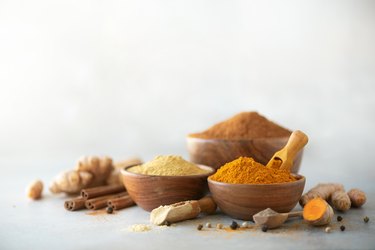
If you're not cooking with turmeric yet, it's a spice you'll want to add to your repertoire. The classic seasoning that gives curry its golden yellow color comes with some pretty impressive health benefits — but your body likes it even better when paired with another common spice, black pepper.
Video of the Day
Video of the Day
Why You Should Always Combine Turmeric and Black Pepper
Turmeric is a major source of a polyphenol called curcumin. There's only one problem — it's not absorbed very well in our bodies. That's where black pepper comes in.
Pairing turmeric and black pepper, which contains a substance called piperine, can help you absorb the curcumin better — 2,000 percent better, specifically, by keeping the curcumin in the body longer, according to an October 2017 review study published in Foods.
"The bioavailability of curcumin in humans is low," Michelle Loy, RD, says. "That bioavailability increases by consuming curcumin with food, piperine from white or black pepper, fats, or through encapsulation."
1. The Combo Can Fight Inflammation
Inflammation is a normal process in the body. If you've ever had a fever, you've had inflammation — or more specifically, acute inflammation. The problem with inflammation lies when it becomes chronic, or long-lasting. Chronic inflammation has the potential to wreak havoc in the body and puts you at risk for conditions including gastrointestinal issues, type 2 diabetes and heart disease.
"Turmeric helps dampen down one of the most inflammatory cascades in the body known as NFkB," Heidi Moretti, RD, says.
One of the largest bodies of evidence on turmeric's health benefits lies within its anti-inflammatory properties. According to a December 2016 randomized, placebo-controlled, double-blind study published in Inflammopharmacology, participants with osteoarthritis in the knee who took turmeric extract had their inflammation suppressed and had improved clinical markers of inflammation.
Another randomized controlled trial, published in December 2015 in Clinical Nutrition, measured markers of inflammation in participants with metabolic syndrome. Researchers concluded that supplementation with 1,000 milligrams of curcumin with piperine helped lower inflammation.
These studies indicate the potential of turmeric when combined with black pepper to alleviate symptoms and clinical markers of inflammation. However, nutrition research is often dose-dependent, meaning researchers use a specific dose to find a desired outcome. In some cases, those amounts are larger than what you would ingest at a normal meal.
For example, there is around 400 milligrams of curcumin in 2 teaspoons of turmeric powder, which is more than you would eat at one sitting and much less than what might be used in a particular research study. However, there is a silver lining — turmeric is well-tolerated by most people, so adding more turmeric and black pepper to your diet may yield some relief of inflammation over time.
2. Pairing the Spices Might Provide Pain Relief
For those with chronic pain, over the counter medication can be a way of life. However, extended use of pain relievers isn't good for your gastrointestinal system.
Researchers found that curcumin supplements may be just as effective as NSAIDs (nonsteroidal anti-inflammatory drugs such as Advil) without the side effects, according to a May 2019 review study published in Nutrients.
And participants with knee osteoarthritis taking 500 milligrams of curcumin reported similar improvement in the severity of their pain as those taking medication for pain relief, according to an April 2019 study published in Trials. Those taking curcumin also reported fewer side effects than those on medication. This study had a few flaws — it wasn't blinded (which means everyone knew which treatment they were on), it only looked at one type of arthritis and the study period was relatively short.
The results for curcumin are promising, but there's still a long way to go to deem it an effective pain treatment for most people.
How to Get More Turmeric and Black Pepper Every Day

The explosion of media exposure on turmeric has led to an increase in awareness of all of the ways to get more turmeric in your diet. Here are a few dietitian-recommended tips for adding it to your daily diet:
- Mix turmeric and black pepper together and sprinkle it on roasted veggies, grilled chicken or fish. You can even use it as crust for your favorite proteins.
- Add it to yogurt with honey for a delicious savory yogurt snack.
- Add it to eggs: "I add turmeric to my tofu veggie scrambles. The golden hue adds a bright appeal," says Lauren O'Connor, RD.
- Mix it into your favorite drinks: "I like to add turmeric to my smoothies, especially with bold-flavored tropical fruits like mango or pineapple," Shannon Garcia, RD, says. "I love making a golden milk latte with milk, turmeric, black pepper and honey instead of my morning coffee," Allegra Gast, RD, says.
Try this recipe for an easy, 10-minute golden milk latte.
Warning
Getting turmeric from foods is safe, but if you'd rather take a supplement, talk to your doctor before doing so. High amounts of turmeric may interfere with blood-thinning medications, according to the Linus Pauling Institute. Never stop taking your prescribed medication before speaking with your doctor first.
- Foods: "Curcumin: A Review of Its’ Effects on Human Health"
- Inflammopharmacology: "Curcuma Longa Extract Reduces Inflammatory and Oxidative Stress Biomarkers in Osteoarthritis of Knee: A Four-Month, Double-Blind, Randomized, Placebo-Controlled Trial"
- Clinical Nutrition: "Antioxidant and Anti-Inflammatory Effects of Curcuminoid-Piperine Combination in Subjects With Metabolic Syndrome: A Randomized Controlled Trial and an Updated Meta-Analysis"
- U.S. National Library of Medicine: "Turmeric Anti-Inflammatory and Cell-Damage Trial (TACT)"
- Nutrients:"Curcumin in Autoimmune and Rheumatic Diseases"
- Trials: "Safety and Efficacy of Curcumin Versus Diclofenac in Knee Osteoarthritis: A Randomized Open-Label Parallel-Arm Study"
- Linus Pauling Institute: "Curcumin"
- "World Journal of Gastroenterology"; Spices ... ; I. A. Al Mofleh; June 2010
- "Food and Chemical Toxicology"; Piperine ...; P. Chonpathompikunlert; March 2010